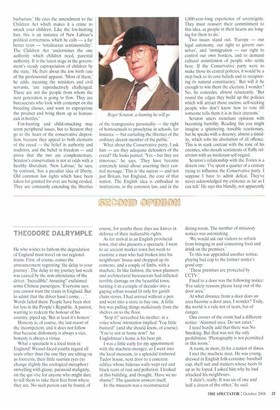THEODORE DALRYMPLE
He who wishes to fathom the degradation of England must travel on our regional trains. First, of course, comes the announcement regretting 'the delay to your journey'. The delay to my journey last week was caused by the non-attendance of the driver. :Incredible! Amazing!' exclaimed some Chinese passengers. 'Everyone says you cannot trust the trains in England. But to admit that the driver hasn't come. . . Words failed them. People have been shot for less in the People's Republic. A patriot, wanting to redeem the honour of his country, piped up, 'But at least it's honest.'
Honesty is, of course, the last resort of the incompetent, and it does not follow that because dishonesty is always a vice, honesty is always a virtue.
What a spectacle is a local train in England! Weasel-faced youths regard all seats other than the one they are sitting on as footrests, their little saurian eyes (to change slightly the zoological metaphor) swivelling with glassy, paranoid malignity, on the qui vive for anyone who might dare to tell them to take their feet from where they are. No such person can be found, of course, for youths these days use knives in defence of their inalienable rights.
As for arrival in an English provincial town, that also presents a spectacle. I went to an ancient market town last week to examine a man who had broken into his neighbours' house and chopped up its contents, and a couple of limbs, with a machete. In like fashion, the town planners and architectural bureaucrats had inflicted terrible damage on the beautiful town, turning it in a couple of decades into a gaping urban wound fit only for garish chain stores. I had arrived without a pen and went into a store to buy one. A little boy was pulling things maliciously from the shelves on to the floor.
'Stop it!' screeched his mother, in a voice whose intonation implied 'You little bastard!' (and she should know, of course). 'You're not at home now!' An Englishman's home is his bear pit.
I was a little early for my appointment with the machete-monger, so I went into the local museum, in a splendid timbered Tudor house, next door to a concrete edifice whose hideous walls wept red and black tears of rust and pollution. I looked at this building, and thought, 'Have we no shame?' The question answers itself.
In the museum was a reconstructed dining-room. The number of minatory notices was astonishing.
'We would ask our visitors to refrain from bringing in and consuming food and drink on the premises.'
To this was appended another notice, playing bad cop to the former notice's good cop: 'These premises are protected by CCTV.'
Fixed to a door was the following notice: 'For safety reasons please keep out of the door area.'
At what distance from a door does an area become a door area, I wonder? Truly, the world is a vale not of tears, but of danger.
One corner of the room had a different notice: 'Alarmed area. Do not enter.'
I need hardly add that there was No Smoking. But that was not the only prohibition. 'Photography is not permitted in this room.'
A room, in short, fit for a nation of slaves.
I met the machete man. He was young, dressed in English folk-costume: baseball cap, shell suit and trainers whose heels lit up as he loped. I asked him why he had attacked his neighbours.
'I didn't, really. It was six of one and half a dozen of the other,' he said.


















































































 Previous page
Previous page